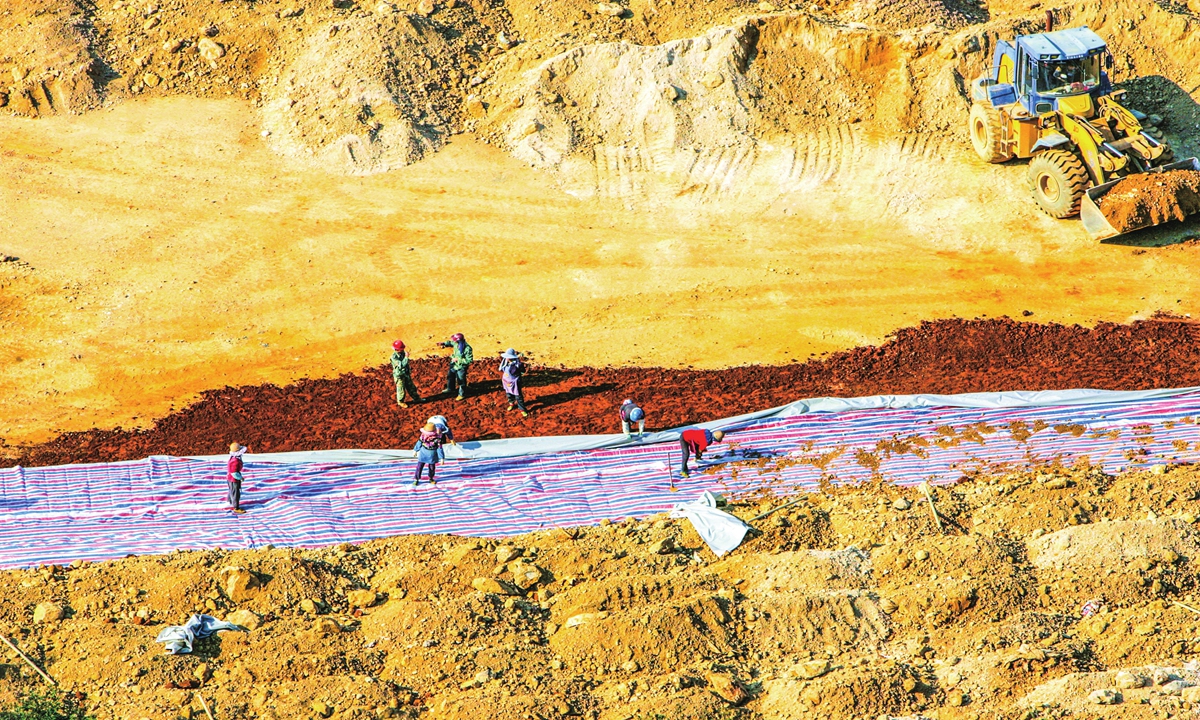
File Photo of a rare-earth mine in Southwest China's Yunnan Province Photo: VCG
Recently, the State Council unveiled a set of regulations on rare-earth management. The regulations clearly stipulate that rare-earth resources belong to the state, and no organization or individual may occupy or destroy rare-earth resources. The state implements protective mining of rare-earth resources. As with previous adjustments in China's rare-earth management, the announcement immediately attracted attention from Western media. This is due to the crucial role of rare-earth resources in high-tech manufacturing and green energy transition, as well as the Western media's perspective on China.
Rare earths are known as "industrial vitamins" and are sometimes referred to as "industrial gold," highlighting the importance of this non-renewable strategic resource to modern industry. China is a major country in terms of rare-earth resources and production, supplying more than 70 percent of the world's rare-earth raw materials with less than 40 percent of the global rare-earth resources for many years, thus playing an important role in meeting both domestic and international demand. However, China is also under considerable pressure regarding rare-earth resources and environmental protection. For a long time, the development of rare-earth resources has been plagued by issues such as illegal mining, destructive mining practices, unplanned and excessive production and illegal trading of rare-earth products. The regulations are a manifestation of demand and logical necessity as a crucial step toward the standardized management of rare-earth resources in China, significantly promoting high-quality industry development. Consequently, the announcement of the regulations has been widely welcomed by the industry, leading to a surge in rare-earth stocks.
However, some Western media claim that restricting rare earths supply "might help increase tensions" between China and the West. Some US media even assert that China's control and stockpiling of critical minerals is preparing for potential wars. These surprising statements reflect an excessively securitized mind-set. China has its own pace in protecting rare-earth resources and will not politicize or weaponize them. In fact, some Western accusations against China, including frequent interference with normal corporate investments in minerals, extraordinary stockpiling of strategic mineral resources and economic coercion against other countries, are what some of their own countries are doing to China and other developing countries.
The development of rare-earth resources is crucial for both international markets and the transformation and development needs of domestic industries. However, this should obviously not come at the expense of the environment through practices akin to draining the pond to catch the fish. Moreover, as rare earths are vital dual-use resources for both military and civilian applications, we must also prevent their circulation through non-legitimate channels internationally, which could pose risks to the security of our country and others. The Ministry of State Security previously disclosed that in recent years, some foreign spy agencies and other institutions with complex backgrounds have long coveted the achievements of China's rare-earth industry. They have frequently engaged in intelligence theft, technology extraction, and mineral theft, with a few companies even requiring relevant products to meet the military procurement standards of certain countries. From the perspective of safeguarding our national security and maintaining global peace and stability, it is absolutely necessary to firmly close this loophole.
The recently introduced regulations on rare-earth management are not an export control ordinance but rather administrative legislation aimed at standardizing the development and utilization of rare-earth resources in China. At the same time, they will also contribute to the standardized development of the global rare-earth industry. As the country with the world's largest reserves and production of rare earths, China has been adjusting and regulating relevant policies and management approaches throughout its development. After years of accumulation, China has achieved relative advantages in technical standards, product quality and environmental protection. China has no intention of choking any country; the relevant management regulations do not target any specific country. However, as a major producer of rare earths, China bears the responsibility of a major power and must ensure the peaceful use of this resource.
As a significant player in the global trade in rare earths, China is not only a producer and exporter of rare earths but also a major importer. China approaches the development and utilization of rare earths responsibly and has consistently been committed to contributing to the stability, growth, and resilience of the global rare-earth industry chain. When it comes to global resources and energy trade cooperation, such as rare earths and oil, an overly politicized approach is far more detrimental than beneficial. Only by achieving healthy and sustainable development of the rare-earth industry can China better safeguard the security and stability of the global industrial chain. The international community should understand and welcome this outcome.




